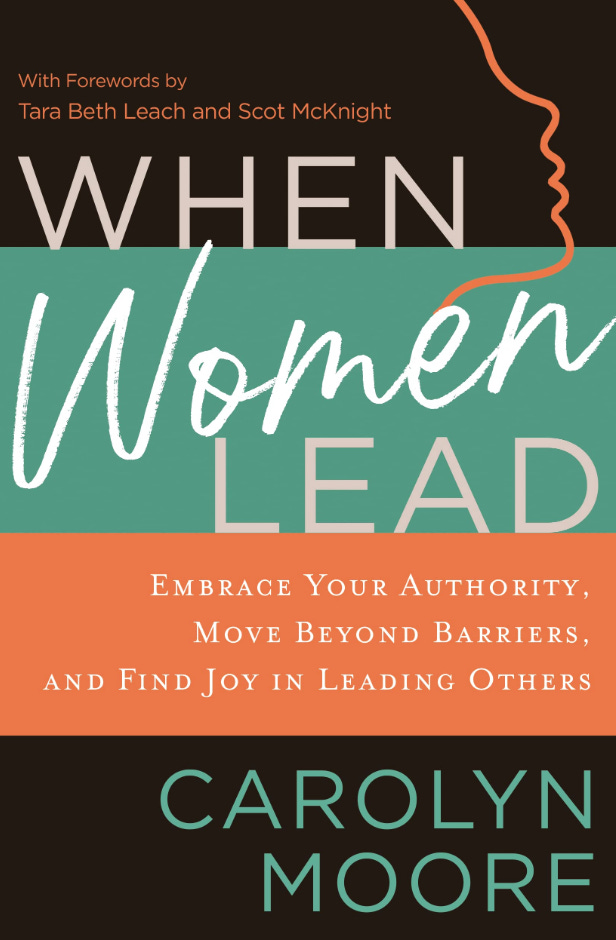People, as I wrote on yesterday’s Substack about John Blake, don’t change their mind on the basis of facts or information; they change on the basis of relationship. I would urge all people to get to know women pastors and women leaders. Carolyn Moore, and her wonderful new book, When Women Lead, form into someone you can know by reading. Get to know her.
It’s taken me two readings of this book to get it, and the reason is that I’m a man.
She writes about five barriers for women who lead. Here they are:
First, theological barrier. About 50%, in the conservative church south almost 60% don’t believe women should be pastors. And “worldview impacts financial viability,” which means most churches with women pastors struggle financially.
On the theological barrier, the conversations always begin in the wrong place: with the clobber passages instead of Genesis 1-2. Does the Fall impact how to begin this conversation or not? Did the Fall distort the relationship of men and women or not? Carolyn thinks the Fall distorted the original relation of creation – that Genesis 3 messed up Genesis 1-2.
The Fall turned our world toward “manning up and womaning down.”
If you recall, I [she] began this chapter by sharing a typical scenario wherein folks come to me, asking for my take on women in ministry, noting that a majority have not done their own research. Very few can quote the Bible on this topic; fewer still have read commentaries or done the exegetical work to form their own opinions. They just know what they've heard, and they find themselves questioning whether their participation in our church is in line with their hunches. The world is full of people I'll never talk to who are not convinced that women ought to be leading. What they are likely responding to (though they don't even know this is what is happening in the recesses of their mind) is their own fallenness – fallenness that makes us all prone to want hierarchies over partnerships.
Second, the perception barrier. People perceive women differently than men, and that happens on identical issues. The same thing perceived as aggressive for a woman will be perceived as assertive for a man. “Are you surprised? If so, you’re probably not a woman.” Bingo!
“When women violate the norms of likability – say, by being more assertive than is usual for their gender – they pay a price and reputation. When they opt for being well liked (in other words, more passive), they are seen as less competent.”
Musicians in an orchestra have to audition behind screens in order assure fairness in evaluation. When they put all auditioners behind a screen the percentage of women who rose to the level of approval for the orchestra went up dramatically. “Are you surprised? If so, you’re probably not a woman.” (Carolyn Moore only writes that one time but I have re-used it.)
The double-bind: be liked and seen as less competent; be a leader and be less liked.
Superstar women don’t break the glass ceiling because most aren’t superstars. Women live with an inner tension about their presence as leaders. They have to apologize their way into the room. People often don’t perceive women to be leaders. Even when they are. “Gender bias is real.”
Third, resources and benchmarks barrier. Female church planters and pastors tend not to receive the same resources as males and, since everything is measured by numbers (attendance, dollars, baptisms) and since the under-resourced don’t meet the numbers, female church pastors don’t get the resources that make it easier to meet benchmarks. “Are you surprised? If so, you’re probably not a woman.”
Which means they are not provided as much as men are with mentors and coaches, training, finances, and congregational leaders. Which means “Women spiritual leaders are being asked to work harder, with fewer resources at their disposal, to reach unrealistic goals based on the standards of a male-dominated culture.” Frustration leads often to burnout. But “God is not broke.”
Fourth, pastoral care barrier. Pastors care about people, and caring for people can lead to burnout. Carolyn admits the stereotype, that women pastors have “a more nurturing, connected approach to relationships.” She thinks women tend to see pastoral care as “who she is” more than one of the tasks of the pastor. Which looks like women ought to be pastors doing pastoral care, except it doesn’t work that way. No one person can care for a congregation. I know too many pastors who cannot say they “gave away too much at the altar of ‘pastoral care’.”
Here's the issue: Moore’s natural gift is the builder and entrepreneur, not the pastoral caregiver. But she knows the tendency of some to be too invested in pastoral care. She asks, “How do strong, competent, gifted, and called women of God not get stuck in the rut of mothering every person who comes through the door?” Codependence is a killer, boundaries are a must. Of course, this applies to both men and women but Moore is addressing a barrier for women in ministry, and meeting the needs of everyone is not possible.
Fifth, the biological barrier. Both of our current pastors had two babies as pastors, one has two girls and one has twin boys. I don’t think the situation was handled perfectly, but our church made it through. (Groans deleted.) Ah, the “maternity and ministry” tension. It must be said: our culture does not find that tension with paternity and ministry. That’s a reality women pastors navigate. Pregnancy, birth, rearing children, menopause.
Spiritual leadership can be exhausting. For women, the strain can be severe, and not just for the reasons we've already mentioned. From the childbearing years to mid life, women experience distinctive seasons that affect everything. We bear children, bear the responsibility of mothering, and bear up under the challenges of midlife, all while learning to lead and live well both in ministry and life. All of it carries a certain tension.
Women feel it. “… and while there are no right or wrong answers, a woman will certainly need to count the cost of her decisions and take nothing for granted because, for women who lead, the pendulum swings easily from feeling overly guilty to feeling overly tired.”
Then there is the double shift of women when they get home: pastor during the day, mothering at home. Then there is the loving work and loving family tension. Then there’s menopause.
Balance is a myth, she says. Life can’t be compartmentalized. She calls for a “a holy rhythm of work and rest.”






This hits really close to home. I lost the quote I pulled on the app here but the inner tension, and I think you said "apologize your way into the room," was super damaging to me. I haven't been in pastoral ministry for several years now. I want to go back but it's hard to see a way. Thanks for this article. I'm going to grab the book.
Some of these gals are going to figure out they need to market to women and forget about the men. Market is a terrible word, but that is what's happening. I really don't care what the shape of the body that is teaching and some men will find working for and with women easier than all this ambition and competition. Being "nurturing" creates collaboration.
It seems God set this up for mama to spend A LOT of time WITH children. Children are not objects. Understanding how humans develop and then being available to do that is a FULL TIME JOB. It's NOT fair. AND the right thing, the kind thing may be she's going to have to pray, reflect, get a God hearing counselor and listening community to discern IF she should choose. Form your kids well or lead. We all WANT it all. And God designed us with limits. There needs to be more attention on how we are designed. We are all designed to desire meaningful work. Finding out what that is BEFORE having childen seems important.
What I'm noticing is women I'm meeting, 45-60, are talking more and more about seminary. There's a lot of interest in spiritual things, they are enrolling in all sorts of classes and trainings. They are finding each other in these venues. Then they realize a degree is possible. There's online groups and traveling to be with each other. I think it's hopeful. In home churches, ministering in neighborhoods is going to be wonderful! A woman who starts at 45 has 40 years to talk about Jesus. I'm currently attending a church of about 85 people. There are 3 women, one just graduated with her Ph.D, one just enrolled in the program and the third is midway through. They are all older.
This is an extraordinary and exciting time for women. And Scott, we are thankful for your voice!